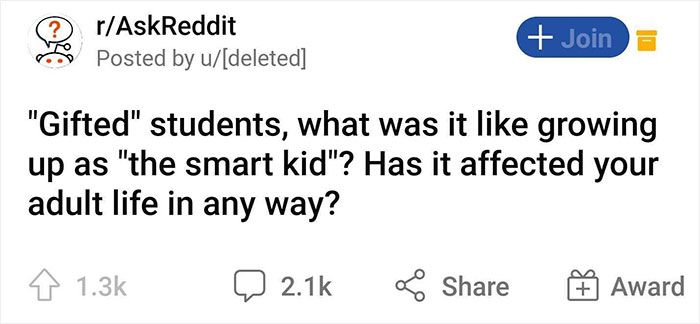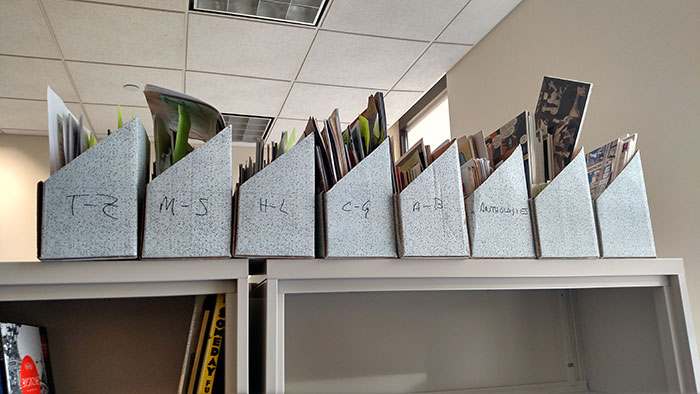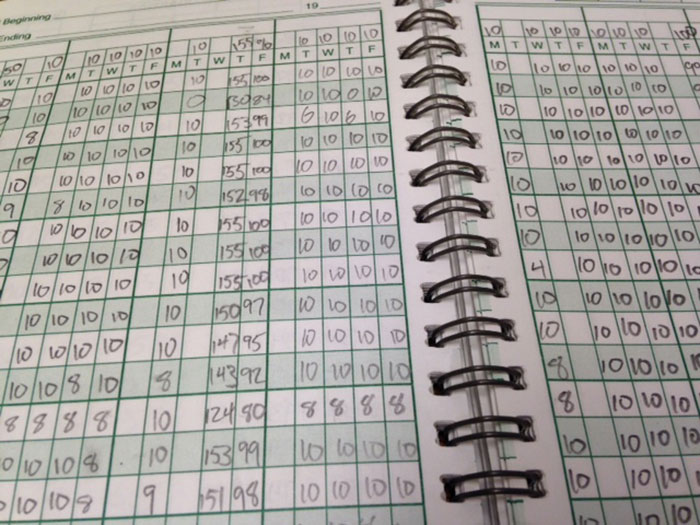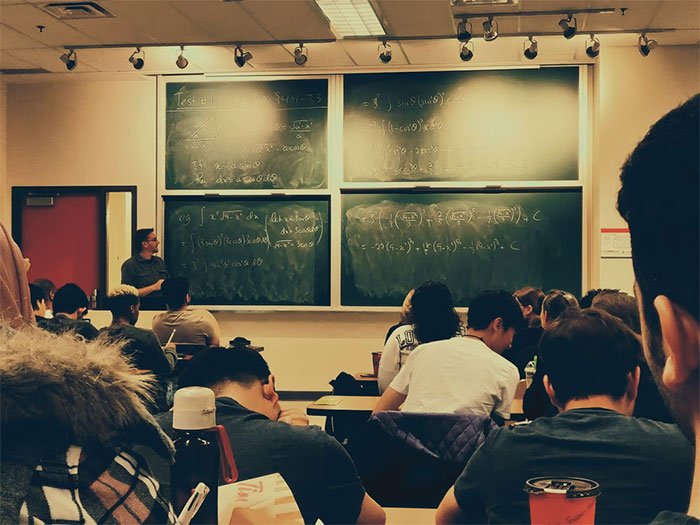Perfectionism isn’t all it’s cracked up to be. In fact, it can be incredibly harmful to our emotional and psychological health if left unchecked. The desire to control everything at all times, in a world that often is outside our control, can lead to anxiety, stress, even depression. So it’s no wonder that some people, who were gifted students at school and constantly praised for their achievements, are now severely disappointed with the lives they lead. Perfectionism is all they know. And it hasn’t served everyone well. I would know, being a former ‘smart kid’ and recovering perfectionist myself.
Reddit users, all gifted students themselves, opened up about how their lives have turned out. Quite a few shared some of the issues they faced, such as never learning to properly study or how to put in consistent hard work. Meanwhile, others noted some of the upsides, such as the ability to come up with amazing ideas on the fly and acing tests… which, of course, have their own drawbacks, too.
Scroll down to read the tales of these former gifted students and how growing up as the ‘smart kid’ affected their adult lives. Keep in mind that perfectionist parents tend to raise perfectionist kids. They can then eventually grow up and become perfectionist parents themselves who go on to put undue pressure on their munchkins to perform well at school. And the whole cycle starts anew, with stress and pressure left and right.
Bored Panda reached out to Lenore Skenazy from New York for a chat about perfectionism in the modern world. Lenore is the president of Let Grow, a nonprofit promoting childhood independence and resilience, and the founder of the Free-Range Kids movement. As she put it, control is a “figment of our imagination” and the desire to be ‘perfect’ can backfire dramatically. Scroll down for the full interview.

#1
Since everyone is telling you you're a genius and you're special and you're capable of amazing things when you grow up... you spend the first twenty years of your life expecting success to fall into your lap. When you finally realize it won't, you're still stuck with your terrible work ethic.
Image credits: Maoman1
#2
Lack of discipline, bad work ethic, started becoming more and more lazy and even falling behind everyone else. Even now, studying at the university, I fail pretty much all of my exams the first time I take them, cause I never actually learnt how to study in the first place.
Image credits: sargro
#3
I certainly lack the organizational skills that a less intelligent person was forced to develop, because previously, I just kept it all in my head. Now, of course, there are far too many things going on, and they last so much longer, that it's virtually impossible to keep everything in my head. But I lack the discipline and skill necessary for, say, a schedule book. Intelligence is not wisdom, and it is not common sense, and it is not discernment. It is, however, unfortunately, very highly regarded as a standalone product when, as a standalone product, it does not really add value.
Image credits: naery
Childhood independence expert and author Lenore explained to Bored Panda that we imagine that we control everything when in reality, seeking control makes us more anxious. “The thing about being ‘perfect’ is that we never know all the workings of the universe. So to assume we can control everything and make it perfect is foolish,” she told Bored Panda.
Lenore quoted a part of her book, Free-Range Kids, that dealt with the topic. “[Control] certainly isn’t required for good child-rearing. And to the extent that we do manage to solve all our children’s problems—or keep those problems from ever even popping up— we are doing them a disservice. Not a fatal one that will stunt our children forever. (That would still be control, right? The ability to control exactly what our kids become.) But still, we are steering them away from the real source of confidence and independence, which comes from navigating the world and its surprises. Especially the unpleasant ones.”
Lenore then explained to Bored Panda exactly what she means by this. “What I mean is: striving to be ‘perfect’ can actually backfire,” she said.
#4
When you don't have to work at anything (intellectually), you're completely unprepared for those things that do require work, like essays, partner projects, etc. So you end up missing out on a lot of study skills, which all have a direct corollary to "adult" skills.
Image credits: naery
#5
Have to say the best part of growing up gifted was the "well what'd you miss" I'd get from parents when I brought home anything less than a 100.
Image credits: mckinnzj
#6
Now that I'm out of school, I realize how much of my self worth I wrongly placed in my grades/GPA.
Image credits: reddit
The desire to be ‘perfect’ can cause a lot of damage, whether you’re a parent or not. But it’s especially in raising our kids that perfectionism can do more harm than good. For everyone involved. The main issue? Kids need to learn to take care of problems themselves. Independence is vital growing up.
“Making sure your child NEVER has to be uncomfortable or scared or lonely or frustrated—trying to ‘concierge’ their life—means kids arrive at adulthood without much experience in rising to the occasion,” Lenore warned. “In a way, they [the kids] arrive undercooked, unready for life—and that’s not what any of us want for our kids.”
#7
Even worse was being told how "mature" I was for my age; get told enough times and you start to believe it yourself. Turns out I wasn't mature, just different.I was mature because I did what I was supposed to in class, in reality I just didn't really dare to disobey;
I was mature because I didn't chatter with others during class, wasn't because I was mature enough to know better than others, but because I didn't have any friends to talk with.
Yet I was still always told I was "mature," which leads you into believing you are walking down the correct path -- that you have the correct mindset and there's no need to change it.

Image credits: RentacleGrape
#8
I skipped a grade... So, no one saw me as the smart kid but instead as the diminutive thirteen year old ninth grader in Pre Calculus. You learn to keep your mouth shut.It wasn't that great.

Image credits: OminousOmnipotence
#9
I had a horrific work ethic because I learned in elementary school that because I was smarter than the other kids, I didn't have to work as hard. Generally they would give us "GIFTED" work, and whatever time we had remaining once the work was complete was ours to do with as we liked. The result was learning that the other slobs would toil away all day, and by virtue of being smart, we could just d**k around with Lego or whatever. It wasn't until I got older that I learned to "apply" myself, and went the opposite direction. Now I work, arguably, too much.
Image credits: thejacobvshow
According to Lenore, being exposed to a variety of experiences can help toughen us up. That way, we can deal with whatever life throws at us as veterans. “The pain of not getting invited to a birthday party, or failing a class, or not making the basketball team is no fun. But when your college girlfriend dumps you, at least you know you’ve been sad before and lived through it,” the expert gave an example.
“We do our kids a disservice when we make their lives ‘too’ perfect and don’t let them build up some resilience. Sure, we should love and support them. Sure, we want to steer them from true, serious danger. But always intervening in day-to-day frustrations is like going to the gym with our kids and lifting the barbells FOR them. Yes, they have an easier workout. No, they don’t leave stronger.”
As such, modern parents are living with “a new and incredibly heavy burden” that they supposedly ‘should’ be and even can be ‘perfect.’ Of course, this causes a lot of stress and results in kids who are well taken care of, bright, skilled, but don’t have the resilience to deal with the realities of grown-up life.
#10
When people start doing better than you and you become more average, you start becoming a bit disconnected with who you are as a person. For all your life you've identified as the 'smart one', now you have no idea
Image credits: asexybookwyrm
#11
Intellectually, I was waaay ahead of my peer group, but emotionally and socially I wasn't. When I was moved forward a grade, I ended up being the youngest kid in my classes. All of them. So when my classmates were all getting their driver's licenses, I wasn't. When they were all allowed to see the naughty movies, I wasn't. Their parents set curfews that were usually later than mine, because I was younger. And puberty, well, puberty was a very difficult time
Image credits: naery
#12
One thing I missed going from an excellent student in high school to an average one in college was the attention I'd get from teachers as the 'smart one.' I'd always feel they were generally looking out for me more. Of course, it didn't help that college class sizes were gigantic, but that anonymous feeling got to me. A bit embarrassing to admit.
Image credits: Silvercaster
#13
I entered a culture were everyone, teachers, parents, relatives etc valued me for my smarts and so I used that as my yardstick to value other people for a long time.Nowadays I'm more interested in who shows compassion, loyalty, dedication, generosity, humor, etc Had to work really hard to break the filters.

Image credits: Jumbie40
#14
I used to be so proud of my intellectual abilities and saw myself above many of my peers. Now I loathe myself for that and am realizing there is so much more to a person than being "smart" or "not smart". I'm realizing I was a little jerk inside and even if I tried to be nice on the outside, I still probably hurt people.
Image credits: BeLikeTheTreeAndLeaf
#15
Hard. I skipped four years in school - it took me years to come to terms with the fact that I'm allowed to do what makes me happy, not what people expect because "you have so much potential."When I applied to music school my mother's friends openly criticised her for letting me do it, because they couldn't understand why I wasn't moving into a 'brainy' career path like medicine or law. Still get a lot of family members asking why I'm not doing XYZ job that they think I'd be perfect for.
TLDR: Just because you're smart enough to be a rocket scientist, that doesn't mean you have to be one.

Image credits: mamamully
#16
Skipped a grade, which I probably could have used to become more emotionally mature. Cried a lot in math class.
Image credits: Sloane__Peterson
#17
You are segregated (physically and partially by choice) from average people your age, and you tend to only interact with other smart people who are in the same place you are. You might not learn the necessary social skills, especially since many of your peers don't have them either.
Image credits: AgentSmith27
#18
The correcting of other people is what I've found bothers people the most. I can't stand listening to others spout information that is incorrect, especially to smaller children that will repeat the endless cycle of stupid, so I say something. Or, when playing trivial pursuit, you know all the answers, but don't know how you know them and get the trivial or critical thought based games banned in your friend circle because, "she's just going to win anyway!"#19
I used to be the smart kid. Now I'm the knows-a-couple-of-things guy.#20
I have always felt an immense pressure from my family (parents and my parents close friends who are like my aunts and uncles) to work hard and not squander the gift I was born with. I will be receiving my Ph.D in biomedical science and translational medicine next Friday. My current work focuses on identifying a novel protein complex that is involved in Triglyceride metabolism. Hopefully I lived up to their expectations and can leave something behind in this world to benefit mankind....or a pharmaceutical company hires me and pays me a boatload of money.
Image credits: spittingpigeon
#21
I was the typical over-achiever until University, when I had a mental breakdown and developed depression and an anxiety disorder. Turns out, being intelligent doesn't help so much when the family history of mental illness hits you in early adulthood.
Image credits: joinedforafewwords
#22
I wish I had figured that out while getting my aero degrees. One of my advisors even told me it would be OK for me to leave to go to music school. Now I'm 40, I left engineering years ago and I'm about to release my first album. But hey, I'm a rocket scientist too. So there's that.
Image credits: VegaDenebAndAltair
#23
The hard thing about the real world is just that life doesn't work to where you can do nothing and then ace the test. You have to do every single little step along the way. As menial, and useless as those steps may seem, the real world will always take the guy that averages a C on everything and maybe squeaks out a B- on the test over the guy that says f**k the stupid s**t, and still gets 100% on the final test. (Metaphorically speaking)
Image credits: reddit
#24
I've been thinking so often ever since I left for university: What if I'm NOT smart? What if I'm just a self-centered little prick who spends too much time comparing herself to others?There's no real problem with not being as smart as others, but being "the smart kid" was part of my identity for so long. Sometimes it gets really scary and hard, doubting who I am and what I am capable of and how I fit with the rest of the world.

Image credits: BeLikeTheTreeAndLeaf
#25
Lonely, because few share your interests.Lonely, because displaying (showing off?) an intellectual gift brings as much resentment as it does praise (brains are particularly susceptible to resentment because, unlike say soccer or dancing, no one says "hey, your great at that! Thinking just is not my thing lol!". everyone fancies themself to be intelligent, even though everyone can't be).
Lonely, because most people would rather not be corrected, no matter how interesting you personally find the actual accurate information. This might not be clear to you for the first few decades (Actually, did you know that carrots don't substantially aid eyesight? oh, and actually the Pennsylvania Dutch are German. Dutch is an American corruption of Deutsch and....hey, where ya going??)
Lonely, because stories/puzzles/convos that move slow enough to engage most people are interminable to you, and those that move fast enough for you are unintelligible for everyone else.
Lonely because what makes you different can't be seen, so others who're like you might walk right by, and not seek you out. There's no uniform, like a sports jersey our punk rock hair to indicate that you're in the 1%.
Lonely, because logic is your favorite tool, but it is rarely used and often misapplied. Relationships, religion, politics, social situations----it is often OFFENSIVE to apply logic to them. but...you're a logic guy.
#26
Not going to lie, you grow up feeling kind of entitled to good test scores/grades, and when that doesn't actually happen you start re-evaluating your life. Then, when you take classes with other gifted kids, and see that you're part of the "average" section of that group, you reconsider every academic achievement you've received, haha.I'm still a top student in my grade, still too lazy to do my homework (not as much as others though), but I stopped getting upset when my test scores didn't surpass those of my friends.
#27
I am a severe perfectionist. So much so that I sabotage myself because I happen to make a tiny mistake. The only thing I seem to be good at now is work, because I HAVE to have everything perfect.
Image credits: Tomahwk
#28
My self esteem, self worth, and happiness are being sucked up by this void feeling of mediocrity creeping into my life. I feel cheated, or like a cheater. I was given a head start early in life but now I'm sort of back to average. I feel like I was wrongly chosen as "gifted" and that I am a complete waste of resources.
Image credits: ILIKEFUUD
#29
Imposter syndrome out the wazoo. Everyone is going to find out that I don't know what I'm doing/am not working as hard as I should be/am not as gifted as they say I am.#30
There is an exceptional amount of pressure on you to continue to meet previous performances, and you feel like even the slightest perturbation in your scores directly effects your status.
Image credits: AgentSmith27
#31
We're still learning about subject & predicates in freaking high school? And making posters too? When you factor in the two years of core curriculum in college, it felt like my life was in repeats for the first twenty years. Now I'm so tuned out I'll never get back the frequency and make something of myself.#32
We're going to spend a week's worth of classes learning one concept. Gifted Student, you're going to get this in five minutes and sit in the back corner reading for the rest of the week while I get more and more angry and yell at you for not paying attention. I'm going to sent you to in school suspension for one day this week, meaning you'll miss one of those classes. You'll be back in time for the test and still get the highest grade in the class, which will make me hate you even more.
Image credits: CrystalElyse
#33
I got into my state's "gifted" high school program which, unlike most of its kind, included all four core subjects instead of just math and science.It was amazing. College level chemistry, calculus, literature, and geography. Interdisciplinary coordination of all four subjects: e.g. we studied logic in math class while covering rhetoric in language and holding debates in a US government course. Video conferences with topic experts simulcast to all participating schools. A half dozen field trips each year. The opportunity to participate on a FIRST robotics team, which was just a magical experience.
The same five teachers for all four years, who became our mentors over time, and the same twenty classmates, who became my best friends. We even did an annual culminating project that required us to do original research to answer a question no one ever had before. We worked on this project throughout the school year, and it counted as the final exam grade in all courses.
These experiences broadened my perspective, brought me out of a thick shell, and got me hooked on exploring the universe. I can't thank those teachers enough. I an incredibly fortunate to have experienced all of this for free, in a public school system, right here in the US. It truly was a model for how secondary education should work, and I owe much of my understanding of the world to that school district.
#34
It made me lazy#35
Gifted with a terrific sense of cynicism.#36
It gave me a false sense of pride.#37
I befriended a lot of the tough kids growing up because they wanted my homework. I never got bullied and the kids stood up for me if anyone tried to. Recently, those tough kids helped me laugh off a really messy breakup and gave me the reassurance that everything was going to be ok because after all of these years, they still had my back. This special friendship has helped my self-esteem tremendously since I was very young. I grew up in a bad part of town, so you had to know people and have the coolest stuff out there... I was dirt poor, so my mentality growing up was, "if I was able to befriend them, I must be cool." I think that's why I get hot headed at times. Also, I've become a really good resource for some since moving back home after college. Want someone to fix something for you on the low? I got you. Want to find work? I got you, too.#38
My entire life I was top of the class, and I told myself it was okay I wasn't thin or pretty because I was smart. Then I went to a relatively prestigious university and suddenly I was surrounded by people who were just as smart or smarter than me, but also hot. It ruined me, and destroyed my self esteem.I also developed this pathological perfectionism which caused/causes me so much anxiety I'm unable to work and then feeds into itself.

Image credits: fightoffyourdemons-
#39
I often found myself in the 90+ percentile on reading comprehension and math. Took all gifted classes in middle school, graduated high school early.As kid, I always wished I was much smarter. (I wanted to be a genius, instead I have mediocre smarts) I still do this as an adult, but now I also realize how little other people think at times... most of the time.
#40
I was the "smart kid" up until high school. Never studied, everything was easy, advanced reading blah blah blah. Now im a C+/B student and have no f**king clue how to study.#41
IAMA graduate student.Everyone in my program was "the smart kid". Some people have trouble adjusting to an environment in which they are now thoroughly average.

Image credits: Patience_dans_lazur
#42
I got the impression that no rules applied for a while. I was disabused of that notion by law enforcement in my late teens and early 20s but the attitude was a disservice for a while.
Image credits: DoctorLazerRage
#43
Is one of your top 5 strengths finders assessment attributes "ideation" and "can't get s**t done because my focus is totally on the next best idea?"Abso-f**kin-lutely

Image credits: callmebubble
#44
Flunked out of college, depression, some low brow work, then went back to college when I was 25. Only by then I'd built up such a phobia of trying something difficult and possibly failing, that I still failed. I've got a decent job now, bluffed my way into it by browsing through some tutorials on SQL and such the morning before the interview. Still, compared to friends who did do college, I'm easily 10+ years 'behind' by now, which sucks. And I still get incredibly anxious when I actually have to try hard to understand something at work.#45
My nephew actually had serious academic issues because of how smart he is. Hear me out. Up until high school, he didn't have to study whatsoever and he could do all of his homework on the bus. When he started HS, he had no idea how to study and sitting down to actually concentrate on homework was difficult for him too. It probably didn't help that his narcissistic a**hole mother declared that he was a child prodigy a little too soon. God damn do I hate my sister in law...#46
Early on in high school I discovered I could coast with no effort. Went to college because it was expected of me (didn't know what to study) and found out I didn't know how to study/face obstacles. Basically, I went in with this idea of "I'm smart" and when I got in trouble academically, I still clung to that and made a huge mistake: I started telling myself I wasn't really trying. You see, if you don't actually try, you don't fail, or so I thought. I was thinking like "well of course I'm smart, if I really tried I would succeed, but I didn't really try." It didn't help that I was going through some major depression at the time and was rather socially isolated.Anyway, two semester and some bad grades, I dropped out. I built the whole thing up as a boogeyman in my mind and for years I avoided going back. Finally I did, and in a lot of ways, I felt deprogrammed. I was no longer a smart outcast, now I was a guy in his mid twenties attending classes with kids straight out of high school. Pretty humbling, but the whole thing was good for me. I can honestly say I was glad not to have the same pressure on me, or the same expectation to excel.
Going back was a great decision, although I do find myself wishing I've done it earlier. Mostly the consequence of the whole thing has been that I'm always feeling like I'm playing catch-up in my life. Like, here's where I was supposed to be in my late 20's, and here's where I actually am.
#47
When I was younger I was one of the "gifted" students. Scored high on a state test in the third grade and was invited to take an IQ test for entry into the program. I made it in and we got additional use of computers and got to go on a bunch of field trips. We were also encouraged to read at a much higher reading level than our peers. Chess was a very popular pastime in the class and everyone had to know how to play. Also, creative thinking was strongly encouraged and nurtured. During my high school time I was consistently a C student enrolled in all honors classes. I didnt really have problems understanding the work. I just didnt like doing homework. As an adult, academically, im about the same as anyone else who has taken any college level classes. The differences at this point are that I seem to comprehend things faster and and my friends use me like a living google (srsly guys, you have a phone in your pocket. Look it up.) I greatly appreciate the opportunity I had to be part of such a program but I do think that some of those same opportunities would have probably helped the struggling students more.#48
The inflated ego helps a lot with confidence.#49
I took gifted classes throughout elementary and middle school. Without anything ever being difficult to learn and not experiencing the burden of "trying", I lacked a lot of discipline that students who actually put time and effort into their work had at the same age. I fell behind. I fell behind hard. Now I'm a college dropout looking for a job.#50
I had a friend who's parents pushed her. She was given support her siblings didn't get. They used their power working in the school system to get her out of taking chemistry, that she was failing, without any repercussions to her GPA. She ended up as valedictorian, despite not having the top GPA.She got all the scholarships, she gave speeches to important people. She met the president and many industry, business, and political leaders.
She dropped out of college in her second year, got pregnant by some guy from another country that abandoned her. She's a single mom that lives off her parents, works part time as a grade school tutor and is a clown for the circus in the summer.
from Bored Panda https://bit.ly/3coFnZX
via Boredpanda